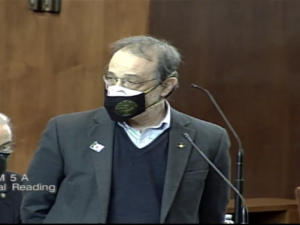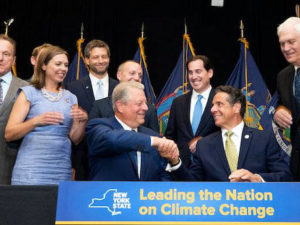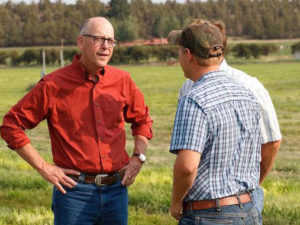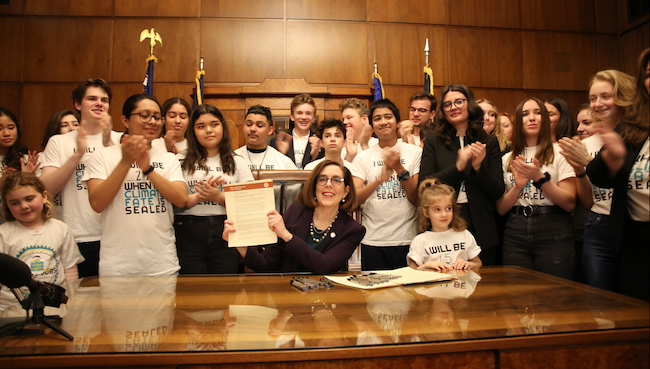
Oregon Gov. Kate Brown, surrounded by youth climate advocates, at the signing ceremony on March 10
By Brian Ettling
On Tuesday, March 10, 2020, Oregon Governor Kate Brown signed a bold climate executive order aimed to cut Oregon’s greenhouse gas emissions. She signed the order surrounded by youth climate advocates, including 16-year-old CCL volunteer and Portland high school student Charlie Abrams. Charlie has been a climate advocate for seven years, attending CCL’s 2017 June conference in Washington, D.C., as a guest speaker, as well as lobbying congressional offices.
During her signing ceremony, Gov. Brown singled out Charlie among the many youths standing behind her, acknowledging his years of work:
Charlie, a sophomore at Cleveland High, has been coming to the Capitol since 6th grade to testify for climate action. That’s 5 sessions of waiting for adults to do something. I’m proud that today, with Charlie & other students, we put an end to that count.https://t.co/m31CeEf78L
— Governor Kate Brown (@OregonGovBrown) March 10, 2020
What will Gov. Brown’s executive order do?
The short answer: a lot. Here are a few highlights:
- Clean fuels. The order will extend and strengthen Oregon’s successful Clean Fuels Program, which has been creating jobs and working for four years to lower pollution from fuels by making cleaner options available. It will add to the Clean Fuels target of 10% by 2025, now aiming to reduce climate pollution from cars and trucks 25% by 2035.
- Clean buildings. The Governor’s order strengthens requirements for new buildings in Oregon, so that by 2030 they’ll produce as much clean energy as they use and will maximize energy efficiency. There will be significant savings on energy bills as homes and buildings use energy more efficiently and waste less.
- Clean economy. Under this order, large polluters will be required to lower climate pollution levels 45% below 1990 levels by 2035, and at least 80% below 1990 levels by 2050. While Oregon has targets for reducing climate pollution already in our law, they’re not being enforced. This new change updates the targets and makes lowering pollution mandatory for large polluters under penalty of law.
Governor Brown’s executive order is considered to be the most sweeping executive order on climate in the nation.
A long road to this executive order
For over a decade, Oregon climate advocates have lobbied the state legislature to pass strong climate action bills. Much of this work has happened in a coalition called Renew Oregon, which includes businesses, workers, healthcare professionals, parents, farmers, ranchers, faith and community organizations, state Native American tribes and more, all working together to move Oregon away from polluting energy to a clean energy economy.
Many Oregon CCL volunteers have been active and engaged in the Renew Oregon coalition for years, helping build political will for this moment. Led by CCLers Gordy Molitor, Brian Ettling, and KB Mercer, volunteers have been mobilizing across the state. As a result, there were more than 100 CCL members at the Renew Oregon 2019 lobby day. After that lobby day, Renew Oregon specifically thanked CCL. Whenever the campaign needed constituents to call from a specific region, we were able to get CCL members to make those calls. Oregon CCLers have made hundreds of trips to Salem for hearings, rallies, and meetings and have spent years doing the hard work of turning public sentiment into political power. We are now seeing the rewards of that work.
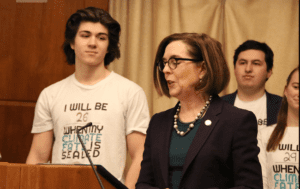
Charlie Abrams looks on as Gov. Brown signs the executive order
The bill we advocated for was not a carbon fee and dividend policy. Oregon’s constitution makes it impossible to have a fee and dividend policy, so we built political will for carbon pricing by advocating for a cap and trade bill. We recognize that not all CCLers supported this bill, and a lot of discernment went into our decision to lobby for it.
The legislation we advocated for all of these years ultimately was not passed. In 2019 and 2020, Republican senators walked out of the legislature to deny a quorum and stop the bill from coming up for a vote. Despite that setback, we did not give up hope, and that has paid off.
For months, Gov. Kate Brown had quietly worked on her own climate executive orders, in case the legislative efforts to pass a climate bill failed. Our efforts to build political will for climate action did not go unnoticed.
Gov. Brown stated before her signing ceremony, “I’ve heard it loud and clear from our young people across Oregon: Climate action is crucial and urgent. Our planet is running out of time. We will put Oregon on a path our children can be proud of.”
In that moment, CCLer Charlie Abrams says he felt, “totally speechless, finally watching an executive order signed into law to do Oregon’s part in saving my future.”
Afterward, Charlie reflected, “I couldn’t help but remember in 6th grade, when I had to tilt my head to look up to Governor Brown and, now, I’m almost a foot taller. For me, this validated that this insane amount of work had finally paid off. I have never been more hopeful.”
Brian Ettling is a volunteer with the Citizens’ Climate Lobby Portland chapter.


